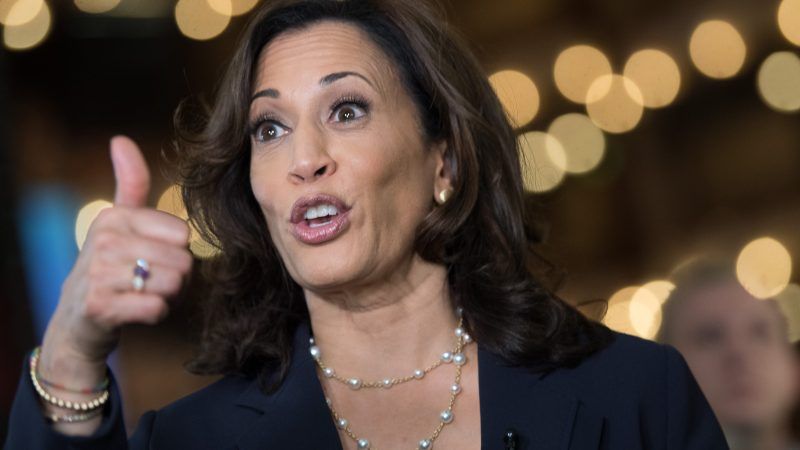Kamala Harris Is Reimagining Herself as a Progressive Prosecutor
Harris is pitching a carefully constructed narrative that seems to be at odds with her record in many ways.

For most presidential candidates, the path to the White House is a decades-long process of rising through the political ranks, building alliances and raising money. A few candidates might wake up and say, "Heck, I'm going to run for the presidency," but most serious contenders are driven by lifelong ambition. Our president is an exception, but that only reminds us of the rule.
Kamala Harris clearly has had lofty ambitions for years as she moved from San Francisco district attorney to California attorney general to our state's junior U.S. senator. She no longer can be dismissed as a longshot after her successful Democratic debate showing and rising numbers in the polls. As Joe Biden looks like yesterday's news, Harris now is among those candidates with a genuine shot for the nomination.
This should be a troubling prospect not only for conservatives, but for the progressive wing of Harris' party. It should also disturb those whose main goal is to replace the current White House occupant. Donald Trump might have an otherworldly sense of reality (it is whatever he says it is), but Harris is pitching a carefully constructed narrative that seems to be at odds with the record.
Forget about all her predictable liberal positions. Every Democratic candidate is going to promise a bevy of lefty policies, ranging from "free" health care to loosened immigration restrictions. To gauge the character of each candidate, voters must look at how each one behaved in prior office. They should look askance at last-minute conversions.
Biden, for instance, supported a war in Iraq that was popular at the time, but now is viewed as a disaster. He authored a crime bill that ramped up sentences. Both measures were products of the time, but they show Biden to be a go-along, get-along guy. Likewise, Harris spent her career as a prosecutor, and there's no indication she was anything but an enthusiastic backer of the law-and-order status quo.
That's a crucial issue, because criminal-justice reform now is a core concern of the Democratic base. It's not only Democrats. President Trump last year signed a justice-reform bill. Many Republicans agree the nation's tough-on-crime policies, created when fear of crime was a top concern, have gone too far. The pendulum has swung back dramatically in the last couple of years.
Harris now depicts herself as a "progressive prosecutor," who has made decisions based mainly on her sense of justice. But as professor Lara Bazelon opined in the New York Times earlier this year, "Time after time, when progressives urged her to embrace criminal justice reform…, Ms. Harris opposed them or stayed silent." She "fought tooth and nail to uphold wrongful convictions that had been secured through official misconduct that included evidence tampering, false testimony and the suppression of crucial information by prosecutors."
I still recall that video of Harris laughing as she recounts telling her coworkers to "look really mean" when they threatened to send a poor mother to jail because of her kids' truancy. Harris now strikes the right progressive stances, but during her career she acted like a tried-and-true drug warrior. There's no evidence that she in any way resisted the zeitgeist.
"By 2005, Harris was also turning against the city's decade-old Drug Court, which allowed some people arrested on nonviolent possession and small-time sales charges to go to a city-run addiction treatment program…," wrote Reason's Elizabeth Nolan Brown. Harris now says she would decriminalize prostitution, but Brown notes, "As a prosecutor she ramped up stings in immigrant communities…spread misinformation about human trafficking, ignored sexual misconduct by police, and aggressively targeted websites where sex workers advertised."
Harris defended the death penalty in court (although she personally opposes it), resisted releasing a man the Innocence Project found not to have been guilty, backedexpanded asset forfeiture (whereby police confiscate property even if its owner wasn't convicted of any crime), and seemingly served as the cat's paw for police unions. Perhaps some conservatives will be cheered by this record, but that's not the point. It's that her past actions bear no resemblance to her new persona.
My theory is she served as a prosecutor in an era when law-and-order policies were popular. She wasn't going to cross some of the most powerful lobbies in the state. This approach would inoculate her from the main "soft on crime" jab that conservatives hurl against liberals, but then a funny thing happened on the way to the presidency. The criminal-justice paradigm shifted quickly and unexpectedly, so now she's left reimagining most of her political career.
Harris' current claims about her career speak volumes about her nature. She's received criticism from progressives who are serious about justice reform, but it's not keeping her from the prize. That's the most depressing lesson. A candidate can totally rewrite her record even though that record is easy to examine—and pay no apparent price for it in the polls.
This column was first published in the Orange County Register.


Show Comments (45)